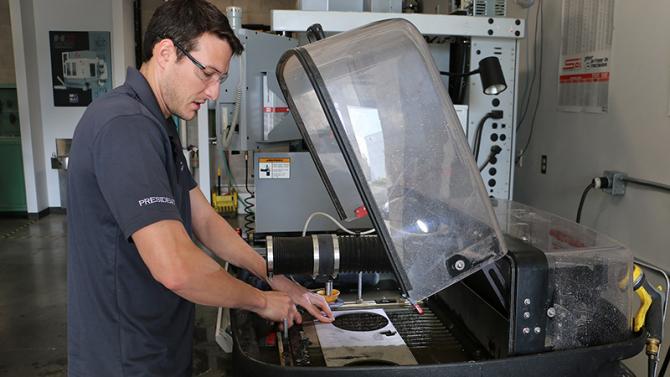Industrial Engineering
College of Engineering
Industrial engineers develop safer and more efficient production processes and act as the interface between technology and humans.
San Luis Obispo, California
The industrial engineering curriculum focuses on both engineering and business principles such as production and service systems design, costs and controls, project and data management.
Opportunities are available for undergraduate and graduate work in many fields of interest. The following laboratories are available for course work and research projects:
- Additive Manufacturing Lab
- Advanced Computer Aided Design Lab
- Business Software Systems Lab
- Electronic Design and Manufacturing Labs
- Facilities Design and Simulation Lab
- The Gene Haas Laboratory for Robotics and Automation
- George Hoffman Industrial Systems Design Lab
- Haas Advanced Manufacturing Lab
- Haas Netshape Lab
- Human Factors and Ergonomics Lab
- Material Joining / Netshape Lab
- Material Removal Lab (Machining)
- Metrology Lab
- Undergraduate Lab
While there are no formal concentrations, you can choose to focus on areas such as:
- Facilities Planning & Design
- Human Factors & Ergonomics
- Operations Research
- Process Improvement & Lean
- Quality Engineering & 6 Sigma
- Simulation
- Systems Engineering
Industrial engineering majors are able to participate in a blended program where you can earn your bachelor's and master's degrees at the same time.
Choose between our two blended programs BS in Industrial Engineering or MS in Industrial Engineering or MS in Engineering Management.
About the Program
Industrial engineering is a business-oriented engineering program that will prepare you to create new products and service solutions for a variety of industries across California and throughout the world.
You will learn to reduce production costs, increase efficiency, improve quality and safety, protect the environment, and comply with government regulations, depending on your area of focus. Ranked as the top industrial engineering bachelor’s programs in the nation by U.S. News & World Report, it is also accredited by the Engineering Accreditation Commission of ABET.
Learn by Doing
Work in the Process Improvement Lab to demo different production setups and learn how to optimize operation efficiency. Use what you learn about database management and design to work with a local business to improve processes and streamline costs. There are many opportunities to investigate, test and apply what you have learned in the classroom in the real world.

Cut Metal with Water
Our Graduates
Although some of our graduates go on to grad school or MBA programs, others are recruited from industry before they even graduate.
Many graduates go into management consulting or work for investment banks as financial analysts. Others find careers in operations management, production planning and scheduling, facility design, human factors design, data analysis, quality control, economic and resource planning and process improvement.
